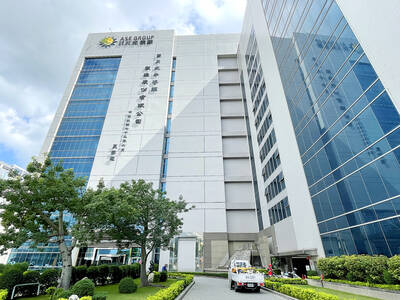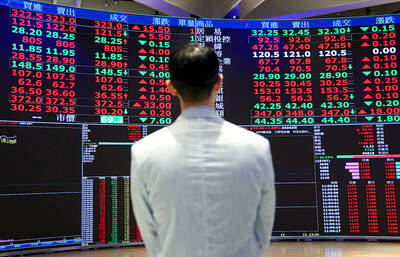Oliver Williamson, last year’s Nobel Prize winner in economics, said yesterday that China’s recent move to break its currency’s two-year peg to the dollar could lead Taiwan to adjust its monetary policy.
Responding to a Taipei Times’ question, Williamson said: “As for Taiwan having to respond to changes in monetary policy in China, I expect this is true.”
He didn’t elaborate when asked whether the central bank should therefore raise interest rates in its board meeting on Thursday.
Williamson, who specializes in transaction cost economics, is scheduled to give talks on economic and financial regulation amid a global economic recovery in Taichung and Taipei today and on Thursday respectively.
The revaluation of the Chinese currency came under pressure from the US and other economies, and this would correct trade imbalances facing the world’s second-largest economy, Williamson said.
Also speaking at the press conference, Lin Joung-yol (林炯垚), dean of the College of Management at Asia University, said that the yuan’s appreciation should be considered a “normal practice” as any long-term trade surplus or deficit had to be adjusted.
“Whether or not the Taiwan New dollar [NT dollar] will follow suit in appreciating is worth observing,” Lin said, as Taiwan maintains a close relationship with China in manufacturing products exported to Europe.
Yesterday saw an influx of foreign funds into Asian currencies, amid expectations that China’s decision at the weekend to make its currency flexible would send the yuan rising.
In Taiwan, the NT dollar rose to a day’s high of NT$31.72, from Friday’s closing of NT$32.19, before edging down to close at NT$31.99, up 0.59 percent, and the highest in a month, following the central bank’s intervention.
Tarsicio Tong (湯健揚), a currency trader at Union Bank of Taiwan (聯邦銀行) in Taipei, said by telephone that the central bank didn’t go so far as to push the NT dollar to depreciate, indicating the monetary regulator still wanted the currency to rise.
“Apparently, the central bank has no intention of letting the NT dollar depreciate as it hopes the currency will rise orderly and moderately. This means that the central bank is following market expectations,” Tong said.
Turnover was US$1.137 billion at Taipei Forex Inc. Including turnover at the smaller Cosmos Foreign Exchange Inc, total trading transactions were US$1.7 billion yesterday.
The trader predicted that the local currency would rise to around NT$31.60 against its US counterpart in trading today and close at between NT$31.80 and NT$31.90.

EXPANSION: The investment came as ASE in July told investors it would accelerate capacity growth to mitigate supply issues, and would boost spending by 16 percent ASE Technology Holding Co (ASE, 日月光投控), the world’s biggest chip assembly and testing service provider, yesterday said it is investing NT$17.6 billion (US$578.6 million) to build a new advanced chip packaging facility in Kaohsiung to cope with fast-growing demand from artificial intelligence (AI), high-performance-computing (HPC) and automotive applications. The new fab, called K18B, is to commence operation in the first quarter of 2028, offering chip-on-wafer-on-substrate (CoWoS) chip packaging and final testing services, ASE said in a statement. The fab is to create 2,000 new jobs upon its completion, ASE said. A wide spectrum of system-level chip packaging technologies would be available at

Taiwan’s foreign exchange reserves hit a record high at the end of last month, surpassing the US$600 billion mark for the first time, the central bank said yesterday. Last month, the country’s foreign exchange reserves rose US$5.51 billion from a month earlier to reach US$602.94 billion due to an increase in returns from the central bank’s portfolio management, the movement of other foreign currencies in the portfolio against the US dollar and the bank’s efforts to smooth the volatility of the New Taiwan dollar. Department of Foreign Exchange Director-General Eugene Tsai (蔡炯民)said a rate cut cycle launched by the US Federal Reserve

HEAVYWEIGHT: The TAIEX ended up 382.67 points, with about 280 of those points contributed by TSMC shares alone, which rose 2.56 percent to close at NT$1,400 Shares in Taiwan broke records at the end of yesterday’s session after contract chipmaker Taiwan Semiconductor Manufacturing Co (TSMC, 台積電) hit a fresh closing-high amid enthusiasm toward artificial intelligence (AI) development, dealers said. The TAIEX ended up 382.67 points, or 1.45 percent, at the day’s high of 26,761.06. Turnover totaled NT$463.09 billion (US$15.22 billion). “The local main board has repeatedly hit new closing highs in the past few sessions as investors continued to embrace high hopes about AI applications, taking cues from a strong showing in shares of US-based AI chip designer Nvidia Corp,” Hua Nan Securities Co (華南永昌證券) analyst Kevin Su

Nvidia Corp’s major server production partner Hon Hai Precision Industry Co (鴻海精密) reported 10.99 percent year-on-year growth in quarterly sales, signaling healthy demand for artificial intelligence (AI) infrastructure. Revenue totaled NT$2.06 trillion (US$67.72 billion) in the last quarter, in line with analysts’ projections, a company statement said. On a quarterly basis, revenue was up 14.47 percent. Hon Hai’s businesses cover four primary product segments: cloud and networking, smart consumer electronics, computing, and components and other products. Last quarter, “cloud and networking products delivered strong growth, components and other products demonstrated significant growth, while smart consumer electronics and computing products slightly declined,” compared with the